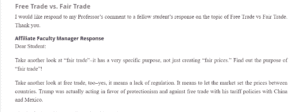Fair Trade
Response to Faculty
The main aim of fair trade is to create a trade environment where poverty is alleviated and improve producers’ lives in developing and developing countries (Dragusanu et al., 2014; Bonello & Lobo, 2015). Fair trade ensures that the prices that producers receive are sufficient to cover their average cost for sustainable production. Furthermore, fair trade facilitates trading partnerships in the long term, enabling enhanced production control within the trading process. An additional Fairtrade Premium is provided and can be used in project investment that increases environmental, economic, and social development by providing producers with pre-financing in cases where it is needed. Lastly, fair trade sets clear progressive and minimum criteria that ensure production conditions and the trade of products that are Fair-trade certified, environmentally responsible, and economically and socially fair (Dragusanu et al., 2014).
Are you interested in obtaining an original copy of “Fair Trade essay”? Get in touch with us.
The World Fair Trade Organization has ten principles that fair trade organizations must abide by daily. These ten principles include creating opportunities for economically disadvantaged producers, accountability and transparency in an organization’s commercial and management relations, and fair trading practices with concerns for producers’ environmental, economic, and social well-being without maximizing profit at their expense. Other principles include fair payment based on mutually agreed ongoing participation and dialogue; ensuring no forced labor or child labor; commitment to freedom of association, women’s economic empowerment, and gender equity. Additionally, non-discrimination, ensuring working conditions are healthy and safe for members and employees; provision of capacity building, which increases positive development impact for marginalized and small producers, should also be considered. The last two principles are promoting fair trade, enhancing justice, and respecting the environment through using sustainably-sourced raw materials and, where possible, buying locally (WFTO, 2019).
Other Related Post: ZOU Fencing
References
Bonello, F., & Lobo, I. (2015). Taking Sides: Clashing Views on Economic Issues (16th ed.).
Dragusanu, R., Giovannucci, D., & Nunn, N. (2014). The Economics of Fair Trade. Journal Of Economic Perspectives, 28(3), 217-36.
World Fair Trade Organization (2019). 10 Principles Of Fair Trade. https://wfto.com/fair-trade/10-principles-fair-trade
ORDER A PLAGIARISM-FREE PAPER HERE
We’ll write everything from scratch
Question
Free Trade vs. Fair Trade
I would like respond to my Professor’s comment to a fellow student’s response on the topic of Free Trade vs Fair Trade. Thank you.

Fair Trade
Fellow Student’s Post
Fair trade is simply described as ensuring that fair prices are paid for products between two countries. This means regulation on tariffs and most other aspects of trade. Free trade on the other hand is the complete opposite. Free trade means no regulations of any kinds (Bonello, & Lobo, 2015). Most notably, the North American Free Trade Agreement (NAFTA) has been a major part of the trade between the countries in North America. The goal of NAFTA was to selectively enforce labor and environmental laws to gain a trade advantage. Instead, NAFTA proved to do the opposite, and it remained unquestioned until recently (Timothy, 2018). There was no regulations preventing countries and companies from taking advantage of each other. Fair trade presents regulations to prevent this from happening. Countries will have fair trade. This is exactly what President Trump did with both Mexico and China when they refused to discuss new fair trade agreements and kept their tariffs high. Trump just raised the U.S. tariffs higher until they both agreed to come discuss fair trade.
This is what minimum wage does at a much smaller level. Minimum wage laws act as a fair trade policy by ensuring workers are paid an amount needed to live and businesses to continue to thrive. Deuteronomy 24:14-15 and Leviticus 19:13 both speak on paying fair wages to workers. Christians and Jewish people both have a responsibility to abide by these laws given by God, but if for those who do not believe in the truths of the Bible and Old Testament, there must be laws put in place to ensure fair treatment.
References
Bonello, F., & Lobo, I. (2015). Taking sides: Clashing views on economic issues (16th ed.).
Meyer, T. (2018) Free trade, fair trade, and selective enforcement. Columbia Law Review,
Affiliate Faculty Manager Response
Dear Student:
Take another look at fair trade–it has a very specific purpose, not just creating “fair prices.” Find out the purpose of “fair trade”!
Take another look at free trade, too–yes, it means a lack of regulation. It means to let the market set the prices between countries. Trump was actually acting in favor of protectionism and against free trade with his tariff policies with China and Mexico.
Thanks for launching our discussion this week!
Blessings,
Professor.


